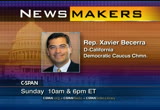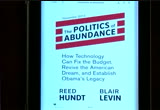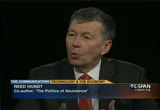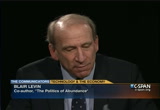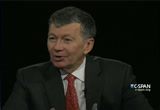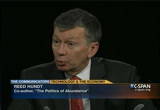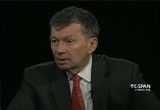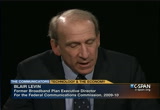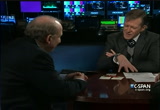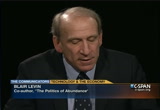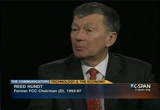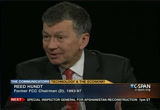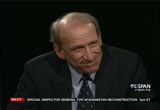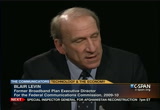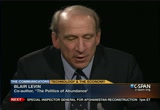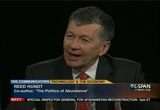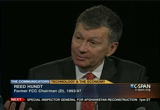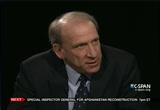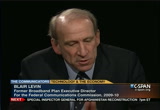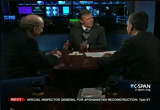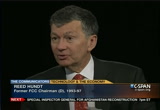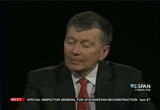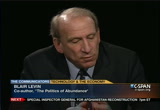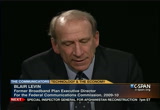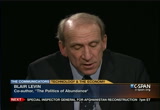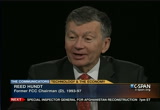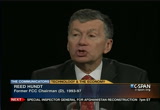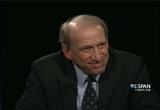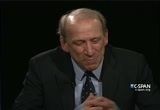tv The Communicators CSPAN January 12, 2013 6:30pm-7:00pm EST
6:30 pm
" --representative xavier bece rra. watch "newsmakers" on sunday. >> student cam video entries with messages to the president are now due for your chance at the grand prize of $5,000. there is $50,000 in total grand prizes. go to c-span.org. >> there is a new e-book called "the politics of abundance: how technology can fix the budget, revive the american dream, and establish obama's legacy." the co-authors are former fcc officials, reed hundt and blair levin.
6:31 pm
thank you for being on "the communicators." how can technology to ask the budget and help us over the fiscal cliff? >> that is the subtitle. it is a bit of a mouthful. the fundamental idea is that if you spend time in silicon valley, if you spend time in detroit where the automobile industry is being rebuilt, if you spend time outside of the beltway, you will see that america has the ability to generate abundance or the world. if you only spent time inside the beltway, it looks like a zero sum game, lose-lose. what we have tried to say in the book is -- what are the lessons of the technology set her? -- sector? how can they give us ideas that
6:32 pm
we can pass into law in washington, d.c. bank? >-- d.c.? >> you talk about two different platforms. >> you can look at areas where they can absorb a lot of capital and were government has appropriate levers. the two that we are really focused on is what we call the power platform, the energy grid needs to be redone, and the knowledge platform. it is about how to apply and deliver rod band that can change education and health and all government services so we can -- broadband that can change education and health and all government services. we want to see it and public services such as education and
6:33 pm
healthcare. >> how important is speed when it comes to improving our economy? >> it depends on a variety of uses. take the medicine for example. we are moving to a place and that is great. when it comes to other things we want to incorporate, we need much faster networks. the other day, bill clinton was saying, we cannot expect our businesses to compete internationally if they only have access to servers less the speed of korea. >> why? >> we all know what we are after. we just need to get there faster. it is cheap to buy the energy.
6:34 pm
and also the energy that you're buying is not polluting the atmosphere are driving up the temperatures or producing droughts or health-related effects from air pollution. we all know this -- we know what we are after. how will be get there? the way we describe it in the book is simple. can you have the federal government to buy the things that are and give them away? not practical and not going to happen. we do not have the ability to add to the deficit. you have to open the door to private investment to do this job. >> and the technology aspect of that is? >> it is manifold. there is a curve, meaning price- performance improves by roughly two times every 18-24 months. in the last four years, we have
6:35 pm
an innovation cycle in batteries. by the end of 2020, it electric vehicles will be priced competitive with gas driven cars. the problem with these things is that we cannot wait. we cannot wait because of the environmental effects and has we need the economy to grow quickly right now. the book lays out a whole bunch of ideas for private investment. >> reed hundt, we had someone from the new york times on the show. he wrote about power plants. he does not necessarily agree that that the internet is terribly green. what is your thought on that? >> he is right about that. data centers comprise of the rut 2% of energy. gy.about 2% ener
6:36 pm
where do they put data centers? some people talk about putting them in the land or canada or on the shores of major rivers. they want the atmosphere to be really cold and the electricity to be she. they are trying to deal with the engineering demands of data centers. those are stopgap solutions. in the long run, we need a clean energy platform that includes all of the above. lots of solar, more wind. here is the beauty part -- it will require trillions of dollars of private investment. because of technological breakthroughs, the electricity will be lower-priced than the electricity today. >> we started with the question -- what are the key problems
6:37 pm
that could be puzzles in the information highway? what are things we should worry about? one of the things i do not anticipate was the number of companies that wanted to develop -- deliver great applications. they did not realize the amount of power it would take to run the data centers. it was beyond the broadband plan which is pretty broad. the other point is, it is green to deliver goods and services it using bandwidth and chips. there are a lot of things in the economy where we know know this is where the economy is going. we want to do it faster, but in a sustainable way. the united states should want to lead in how we do that. >> in the politics of abundance, there are several instances
6:38 pm
where you saved the president could act on his own without congressional approval. what are some of those instances? >> for example, in the area of education, the sector of education -- it is a question of how we accelerate it? the president working with the department of education could create a data exchange system that allows us to personalize education. there is a similar thing with healthcare. the president could use executive authority and lay the foundation and act to accelerate that movement to the digital platform. >> where does congress come in? >> in a number of places. at the end of the book, we lay out for trades we think congress could take part.
6:39 pm
one is related to the broadband area. there was a ceo council that suggested that there are trillions of dollars of savings if the government moved all of its business services to the digital platform. what we proposed is a commission is where you get ceos in a room, make them look at those problems and have specific solutions. give congress an up-and-down vote on what to do. there is an order to do that. that would be worth efficient and things like that. we need to make sure that everyone in the country is online. in other words, if we will move everything to the digital form, which is what we want to do, you cannot leave anyone behind. there are others. >> other examples, let's take
6:40 pm
corporate tax. it seems unlikely that there will be a year-long debate on corporate tax here in washington in the year 20 13. most businesses are global in some respects. not all, but some for sure. if you are big is this and you look to china, you will see in their five-year plans for energy or information technology specific promises to have 50% or print income tax rate. if you look at the united states, you do not know what it is. we need reforms that say to businesses, we want you to invest here in the united states. what we are having this big debate about corporate tax --let's have a bs a part of the corporate tax reform debate.
6:41 pm
-- let's have it to be a part of the corporate tax reform debate. another thing that could have impact on consumers and could be placed on utilities that can be avoided by moving to clean energy. if we had that carbon tax, it would help close the deficit and be a stimulus to the utilities to move to clean energies. that is the second idea. third, many states are following the lead of connecticut. it created a state green bank. the finance is just you did -- a distributed to energy efficiency measures. the federal government loaned money to state green banks at an extraordinarily low rate. these are a handful of different ways to provide finance and support and the tax policy
6:42 pm
support for massive private investment. >> in the politics of abundance , what is the role of the fcc? >> they can take the lead in many topics. they should provide policy ideas that congress and the executive branch will need to work out together. they can reform the rate, the program that we were involved with back in the 1990s, so the things that schools by are closer in description to modern technology and not the old things that are not as efficient as a modern technologies permit. >> in your book, you spent quite a bit of time comparing today to the clinton era. what occurred in the 1990s, what worked? >> what worked was that there
6:43 pm
was a massive private investment starting in the middle of the decade that to a surprising degree, though surpluses in the federal government budget -- it was really the internet that drew that wonderful period where we were not arguing about the scope of. we were arguing about what to do about the surplus. you can see other points in history wherever you have economic growth, it is often do the fact that there there is a technological change going on. we added railroads, steel, cars. what was clear about the 1990s, there was a wonderful consistence -- consensus in the government that worked extremely well. there was an understanding that this was a sector that could
6:44 pm
help our growth. what were the lessons of that time? it was about how to get rid of rolules that made sense years a, but not now? asking that question of each other is what led us to this book. >> given what you just said, what is your take on what the itu is doing right now when it comes to the worldwide internet ? >> they just finished up their group. i haven't had a chance to talk with a lot of friends who were over there. i certainly like -- as well as
6:45 pm
the economics of what the internet can be. there are certain countries that want to protect certain industries and have ideas and mine to do that. i would put myself in as kind of never said that. we should move in a direction that is more about openness and economic growth and the free expression of ideas. >> reed hundt, when it comes to the internet and the politics of abundance, there is a real role for government. is that safe to say? >> absolutely. let's talk about the power grid. you can have a wireless industry and communications. but when you talk about wireless electricity, that is called lightning. this is not a consumer product. you have to recognize that there is a local distribution were those lines that go up and down the street and reach your house, that needs to be owned by
6:46 pm
a company. they need to keep trees from falling on these lines and paradigm and deal with safety issues. -- and repair them and deal with safety issues. around that, you can move to a lean energy platform. there are more than 100 million buildings in the u.s. on average. we ought to have $10,000 of investment for each one of those buildings on average to have a consume less electricity and get the same heating and lighting and air conditioning. there are about 6 million businesses in the united states. millions of them ought to have solar power on the roofs to provide on electricity. many of them have flat roof buildings. warehouses, buildings industry malls, grocery stores. they need to have solar power on
6:47 pm
their roofs as well. solar power can provide up to 18% of the electricity with appropriate financing at prices at or below the levels that exist today. these changes around the electric grid are easily possible if we change the regulatory policies, change the financing policies. you do not need to have a massive overhaul. you do not need a naturalization of businesses. just open the door with regulatory measures and deregulatory measures of private investment. >> if you look back at history, there is a was a role for government when you see this growth and what we are looking for. exactly 150 years ago, congress passed three laws. consider how america became a leader in the world economy. it goes back to those three loss
6:48 pm
-- the transcontinental railroad act, the law that created universities, and the homestead act. in terms of land and human capital, we said we will find a way to utilize them. that is kind of installation for the things we are talking about now. how do we leverage what we have now? >> blair levin, how ubiquitous is broadband in the u.s.? >> we found that by definition it is always a moving target. there are about 7 million homes that do not have access to it. he can solve 80% of that problem relatively easy -- we can solve 80% of that album allegedly easy. -- problem relatively easy. number one, it does not solve
6:49 pm
the problem of how to have economic leadership or how to have the next generation of networks and applications. we cannot sit on our laurels. we need to have a constantly improving ecosystem. there are ideas about that in the book. in the long run, one of the things we have proposed is that if we will have a race to the top with technologies, we need spectrum. there is a lot of extra that come in america. more urban folks benefit from. >> the spectrum option. is that correct? >> that is true. do they need to be more focused, in your view? >> no, i do not think so. i have to admit that my friends are running these arches.
6:50 pm
i think they are doing a good job. no, i do not think they need to be more focused. the idea that blair and the broad baband has gotten broad support. really, the main thing is that this is an example of how it is not that difficult to have really big, profound change once you really focus on it. what is the big change here? there are a lot of signals that are really not reaching no one. they would be just as happy to be on cable tv. that spectrum should be used for smartphones. the change from one to the other is tricky, to be fair to everyone involved. you need to strike a balance. the change is simple. when it happens, this is a good plan.
6:51 pm
you will see tens of billions of dollars of new private investments created. the technology created the potential. folks in the government, they need to figure out how to open the door. sometimes you need a big key. you need to figure out tough company nations of the locks. if you can make those changes, the investment will port into the new opportunities. >> we are talking with reed hundt and blair levin. they are discussing their book "the politics of abundance: how technology can fix the budget, revive the american dream, and establish obama's legacy." one of the examples that you put in your book is what is happening right now in kansas city with google. are you supportive of that project? how does that project plate into the politics of abundance? >> i do not work with google.
6:52 pm
let me give you my interpretation. blair's broadband plan --they said, let's see if we can do this in kansas city. it is tremendous when a business empowers people in its own shops and have that kind of initiative. it is resonating in other cities and states as well. they are following their own method to get similar results. >> they have announced a deployment that i think -- not as large as the google in kansas city, similar in terms of scope. chattanooga has a gigabit deployment. chicago recently put out a request for information. the city wants to deploy gigabit in various parts of the cities and deliver innovation and goods and services.
6:53 pm
they got a number of responses. the groups i have worked with are working with a number of universities. they recognize that broadband is not an entertainment cool. it it is an economic development will. we will need bigger quantities if we want at -- to be at the forefront of the next generation of innovation. >> you said you were at seattle. what is your job? >> i'm at the aspen institute. most of my time is spent with this gigabit project. google did a great thing for this country when they said, we would like to buy this. 1100 communities applied. that does not mean that all of the citizens want to sign up for a gigabit, but it does mean that they recognize that this is the future. we want to lead in that future. we want that to come to our
6:54 pm
communities. one company, one city is not enough. we need a critical mass of maybe 10 or 20. with that university -- we thought university towns were the best places. >> is it economically feasible to do that? >> i'm not sure if it is economically feasible nationwide. part of what they have done very well -- and you have to give the city a lot of credit for this -- they have looked at this as a problem of how to utilize existing efforts alone the costs of the plan? the project in maine and florida and already one in chicago. can we utilize pre-existing apps to bring more bandwidth at a lower price?
6:55 pm
in the short term, that is a idea to get it going. >> what is it that you are doing these days? >> i am on the board of a bunch of tech companies in silicon valley. on the holidays, i'm in charge of thinking up against that are adequate to bring home the kids to see mom and dad. [laughter] >> you have done a great job of that. >> i read somewhere in your biography that you were the first fcc commissioner to have a computer on your desk. >> that is true. on the first to have made a cell phone call to alaska. on the first to have engaged in a lot of things that are so familiar now. some people cannot believe that the world did not always run this way. when we think about the 1990s,
6:56 pm
what we are really proud of is that in the 1990s, everyone on did better.addaer everyone had income growth. the unemployment rate was at a record low. young people still had a sense of opportunity. if we could have that be re- created, everyone under the age of 38 would think that this is a glorious world and i can be the hero of my own life. if we can get that, america owes the future will be boundless. >> when you look at cities down the road, what do you see in the tech world, the telecom world? >> i'm a huge optimist. 10 years down the road, we will have a substantially clean energy platform in the united states. electricity will be cheaper and not more expensive. 10 years down the road, we will have seen about 500-
6:57 pm
600,000,000,000 dollars of new private investment that will create jobs. i see new invention in batteries and solar power and wind turbines and the transmission technologies. they are being proved in labs, but they are not visible in the commercial world. the only thing i see is a caution -- we cannot be patient about this. climate change is real enough, dangerous enough. we have to be starting to work on this tomorrow. >> very quickly, the same question. also, tell us where "the politics of abundance" is available. >> every child will have a
6:58 pm
better education because it will be personalized. teachers will have tools and situational awareness that will allow them to be better teachers. same thing with medicine. doctors will have greater ability to understand what is going on with the patient. as we age, we will be able to stay in our homes longer and have access to great medicine. i'm very excited about that. again, america never fails, but we need to focus now. the book is available on amazon. it is an e-book. there are other sites that people go to. we certainly hope that people buy it and read it. the most important thing is to get these ideas on how to grow, create rate future for the next generation into the policy
6:59 pm
debate right now. >> blair levin and reed hundt and there are e-book "the politics of abundance: how technology can fix the budget, revive the american dream, and establish obama's legacy." this is "the communicators" on c-span. >> tomorrow on "washington journal" we will discuss president obama's defense secretary nomination, chuck hagel. followed by a look at emerging markets and developing countries. we are joined by ruchir sharma. he will discuss his book " breakout nations." "washington journal" live on sunday on c-span. you can watch the public inauguration of president obama's second term, inclu
144 Views
IN COLLECTIONS
CSPAN Television Archive
Television Archive  Television Archive News Search Service
Television Archive News Search Service 
Uploaded by TV Archive on

 Live Music Archive
Live Music Archive Librivox Free Audio
Librivox Free Audio Metropolitan Museum
Metropolitan Museum Cleveland Museum of Art
Cleveland Museum of Art Internet Arcade
Internet Arcade Console Living Room
Console Living Room Books to Borrow
Books to Borrow Open Library
Open Library TV News
TV News Understanding 9/11
Understanding 9/11